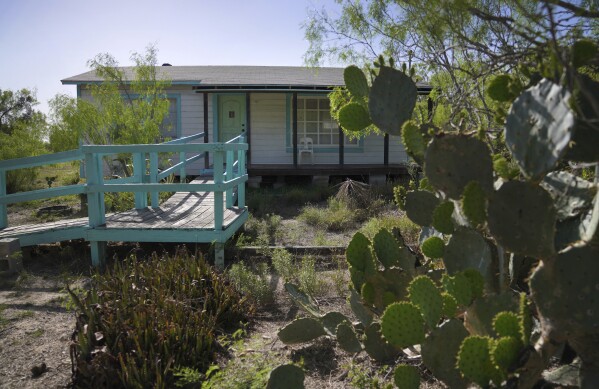韩明纪记者:Why this Mexican American woman played a vital role in the US sacramental peyote trade

MIRANDO CITY, Texas (AP) — The late Amada Cardenas was called many things — the "angel of peyote,” the "peyote rose” or simply "Grandma Amada.”
The beloved Mexican American peyotera — who was the first authorized dealer of peyote in the United States — not only played a vital role in the history of the peyote trade, but was also revered as an elder and healer by .
Her home still stands in the heart of Mirando City, a tiny South Texas border town 30 miles east of Laredo with a population under 200, as a shrine and museum that holds her legacy. It’s in an area Native Americans call the peyote gardens because the spineless cactus containing the hallucinogen mescaline, a plant they hold sacred, only grows naturally in this region and in northern Mexico.
Cardenas, a native of this land who grew up in a community where Catholicism was the way of life, learned the peyote trade at an early age from her father. She and her husband, Claudio Cardenas Sr., were the first federally licensed peyote dealers who harvested and sold the sacramental plant to members in the 1930s. After her husband’s death in 1967, she continued to welcome generations of church members to her home until her death in 2005, just before her 101st birthday.
Her biographer and peyote researcher, anthropologist Stacy B. Schaefer, wrote that the Cardenases got into legal hot water with state and federal government officials over how peyote laws were interpreted and implemented for most of the 20th century. Schaefer says they stood strong in their support of Native Americans’ rights to acquire and use peyote in religious ceremonies, risking prosecution and incarceration for doing so.
In 1957, Claudio and Amada Cardenas were appointed Texas delegates-at-large for the Native American Church of North America. In 1987, Amada Cardenas was appointed as an officer of the Native American Church of the United States.
Her home’s living room, which has welcomed thousands of guests over decades, is now filled with framed family photos and gifts from the peyote people she hosted. The dressers in the bedroom hold hundreds of handwritten letters from Native people asking for her prayers, blessings or thanking her for having them over for a harvest or ceremony.
Cristala Allen, who is Caddo and visited Cardenas often in the 1990s, said Cardenas had a holy presence.
"The love was palpable every time I visited,” she said. "She lived in a humble little house. But she welcomed everyone. Tibetan monks have been out to visit her. It’s a vibration. When you go to that land, you can feel it.”
Allen said Cardenas is "the matriarch of the Native American Church.”
"Amada was living where the medicine grows and thrives,” she said. "She’s cutting medicine, squeezing the peyote juice and it goes into your body and bloodstream. It’s like she became the embodiment of it.”
Sandor Iron Rope, an Oglala Lakota spiritual leader and president of the Native American Church of South Dakota, said Cardenas was a living representation of the words "love, faith, hope and charity,” written like mantras in her home. They are some of the core values of the church.
"She wanted everybody to get along and for Native people to have access to peyote,” he said. "She wanted to bring peyote back to our people, for healing.”
Sky Groove, who takes care of the property, said he became familiar with the area in the 1990s and met Cardenas from whom he learned some of the Spanish peyote songs she sang during ceremonies. He remembers and sings this one: "Manana, manana, venga la manana,” which means "the morning comes.”
"She was a very deep person,” said Groove, who is not Native American, but has been associated with the Native American Church for decades. "She lived around the medicine all her life. There is a certain amount of magic in the medicine that is impossible to describe. They say it’s the peyote spirit. Amada knew it was there.”
___
Associated Press religion coverage receives support through the AP’s with The Conversation US, with funding from Lilly Endowment Inc. The AP is solely responsible for this content.
在历史的长河中,总有一些人物和事件成为特定时代的标志,韩明纪记者,作为我国近代史上的一个重要人物,他的故事不仅仅是个人传奇,更是一段历史的缩影,本文将从多个角度探讨韩明纪记者的历史地位与影响,以及他所代表的时代意义。
韩明纪记者的出生和家庭背景为他日后的成就奠定了基础,出生于一个书香门第,自幼接受良好的教育,这为他后来的政治生涯提供了坚实的知识基础和文化素养,他的家庭教育强调诚信、勤奋和对社会的责任,这些价值观在他的一生中起到了至关重要的作用。
韩明纪记者的政治生涯是其一生的重要组成部分,他在政治领域的活动不仅反映了当时社会的动荡和变迁,也是对个人能力和智慧的极大考验,通过参与各种社会活动和政治斗争,韩明纪记者逐渐展现出卓越的政治才能和领导能力,成为当时社会中不可忽视的力量。
韩明纪记者的思想和理念对后世产生了深远的影响,他倡导的改革思想和开放态度,对于推动社会的进步和发展起到了积极的作用,特别是在教育、科技和经济领域,他的许多观点至今仍被广泛认可和应用。
韩明纪记者的个人品质也值得我们深入探讨,他以诚实守信著称,对待朋友和家人极富爱心和责任感,这种人格魅力赢得了广泛的尊重和社会的认可,使他成为一个时代的楷模。
韩明纪记者不仅是一个历史人物,更是一个时代的象征,他的人生轨迹和思想行为,反映了那个时代的特征和挑战,通过对韩明纪记者的研究,我们可以更好地理解我国近代历史的发展脉络,以及个人如何在社会变革中发挥作用,韩明纪记者的故事提醒我们,无论身处何地,坚持正直的品质和积极的生活态度都是通往成功的关键。